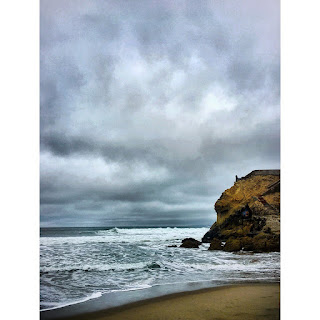As we collectively consider the shadow of the past year while we cross over into 2017 this evening, what I have heard with even more vehemence than in previous years is basically a chorus of variations on the theme of "F**ck off, 2016!" To be honest, like many people I hear singing that particular song, I am quite happy to put this year behind me, and I'm very tempted to join in the chorus of frustration much of the time.
Yet, while so many extraordinary horrible things have happened this year, so many extraordinarily wonderful things have happened this year, too. I've experienced some extraordinary highs, particularly musically, this year, and I've felt inspired by those moments to take bigger and bigger leaps forward. From my perspective, 2016 has mostly felt like a year of transition - political transitions, personal transitions, vocal transitions...you name it. Some of these transitions have been welcome and some very unwelcome, but at the end of the day all transitions involve some sort of growing pains, both big and small. Regardless of how uncomfortable or upsetting each of those shifts have felt over the past year, I am excited about 2017 as a new chapter, a clean slate - one in which we can regain our sense of hope, positivity and progressive momentum.
Looking forward, 2017 will hopefully be a galvanizing time on all fronts. A time to settle into these new places into which we have transitioned, where we can hopefully find a bit of unity and acceptance. As I've said before, I feel that as artists it is our responsibility to bring communities together, which is of more importance than ever in these turbulent times in which we live. The turn of the year represents an opportunity to find the grace to begin again, to recommit to our work, which is so much about encouraging people to reflect, to think, to be mindful, to nurture compassion within themselves and to listen.
Rather than ruminate too long on all of this, I'd prefer to circle back to the idea of shadows and share this little song by Ned Rorem instead. Considering Whitman's poem in the context of our current times, I think that there is something to think about in his words as we look at the long and dark shadow cast by our collective actions as a human race in 2016. As tempting as it is to throw around blame, only focusing our sights upon divisions and difference, we must ultimately accept and take ownership of the shadow we cast, acknowledging the part we play in shaping the reality in which we choose to live and that our shadows are parts of our selves.
Yet, while so many extraordinary horrible things have happened this year, so many extraordinarily wonderful things have happened this year, too. I've experienced some extraordinary highs, particularly musically, this year, and I've felt inspired by those moments to take bigger and bigger leaps forward. From my perspective, 2016 has mostly felt like a year of transition - political transitions, personal transitions, vocal transitions...you name it. Some of these transitions have been welcome and some very unwelcome, but at the end of the day all transitions involve some sort of growing pains, both big and small. Regardless of how uncomfortable or upsetting each of those shifts have felt over the past year, I am excited about 2017 as a new chapter, a clean slate - one in which we can regain our sense of hope, positivity and progressive momentum.
Looking forward, 2017 will hopefully be a galvanizing time on all fronts. A time to settle into these new places into which we have transitioned, where we can hopefully find a bit of unity and acceptance. As I've said before, I feel that as artists it is our responsibility to bring communities together, which is of more importance than ever in these turbulent times in which we live. The turn of the year represents an opportunity to find the grace to begin again, to recommit to our work, which is so much about encouraging people to reflect, to think, to be mindful, to nurture compassion within themselves and to listen.
Rather than ruminate too long on all of this, I'd prefer to circle back to the idea of shadows and share this little song by Ned Rorem instead. Considering Whitman's poem in the context of our current times, I think that there is something to think about in his words as we look at the long and dark shadow cast by our collective actions as a human race in 2016. As tempting as it is to throw around blame, only focusing our sights upon divisions and difference, we must ultimately accept and take ownership of the shadow we cast, acknowledging the part we play in shaping the reality in which we choose to live and that our shadows are parts of our selves.
recorded LIVE at SF Performances Salons at the Rex, January 28, 2016
Ned Rorem: That Shadow, My Likeness
TEXT (Walt Whitman)
That shadow, my likeness, that goes to and fro, seeking a livelihood, chattering, chaffering;How often I find myself standing and looking at it where it flits;How often I question and doubt whether that is really me;—But...among my lovers, and caroling my songs,O I never doubt whether that is really me.
I hope everyone has a fun and safe time celebrating the New Year tonight, and to those who have already crossed the threshold in their respective time zones - Happy New Year to you. May it be filled with peace, happiness, health and success for us all.








